So I finally saw the pilot for the 2017 TV-show Taboo that I am eager to see. For reasons…
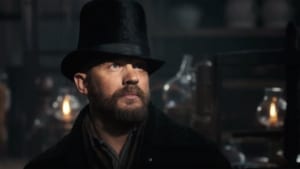
I mean, I also wanted to watch it because it was created by Steven Knight. He’s responsible for one of my current favorite TV-show, Peaky Blinders and also wrote the movie Eastern Promises. But yeah, Tom Hardy is always a good argument to sell me something (sorry, I am weak).
Anyway, Taboo takes place at the beginning of the 19th century (1814). The main character is James Keziah Delaney, an ex-“employee” of the East India Company, who was believed to be dead for ten years. But, the day of his father’s funeral, he reappears and makes the life of everyone involved in his father’s inheritance really complicated. He plans to create his own shipping business and, at the same time, destroy the East India company using their own methods against them.
Now that’s a good subject for a show. Given the opportunity, I too would try to destroy the East India Company. The only downfall is that this would probably be the only thing I would manage to achieve.

But let’s get back to the show. This could also be a total train-wreck. Western (white) society still has trouble talking about things like colonialism, the Native American genocide, imperialism, etc. The show could very well turn into the story of a white savior seasoned with Generic NativeTM culture to make everything more Exotic and Mystical.
Big potential for a very good piece of televisual media. Equally big potential for disaster. So, how was this pilot?
Recap
The episode opens with a threatening silhouette on a boat, which turns out to be Tom Hardy (the silhouette, not the boat). Everyone who read the summary of the episode knows his character’s name is James Delany, and James proceeds to kick the mud in order to bury something. This is the show’s attempt to tell us that Tom Hardy is not here to be a sex-symbol, sadly.
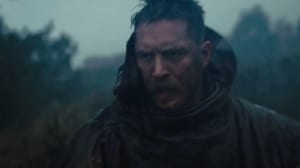
James then makes his way to London to see his father’s body. Once there, he takes advantage of the situation and steals the coins from his father’s eyes while ominously paraphrasing the Catholic’s sacrament of confession.
We then cut to the father’s funeral where we are introduced to James’ sister Zilpha (played by Oona Chaplin), who wasn’t fond of their father. James proceeds to steal the show by making a grand entrance in the middle of the ceremony where everyone thought he was deader than the guy in the coffin. But it seems that being overly dramatic and more than vaguely threatening is our protagonist’s favorite aesthetic. Anyway, the ceremony continues, and the coffin is put into the ground while everyone feels awkward about the undead prodigal son.
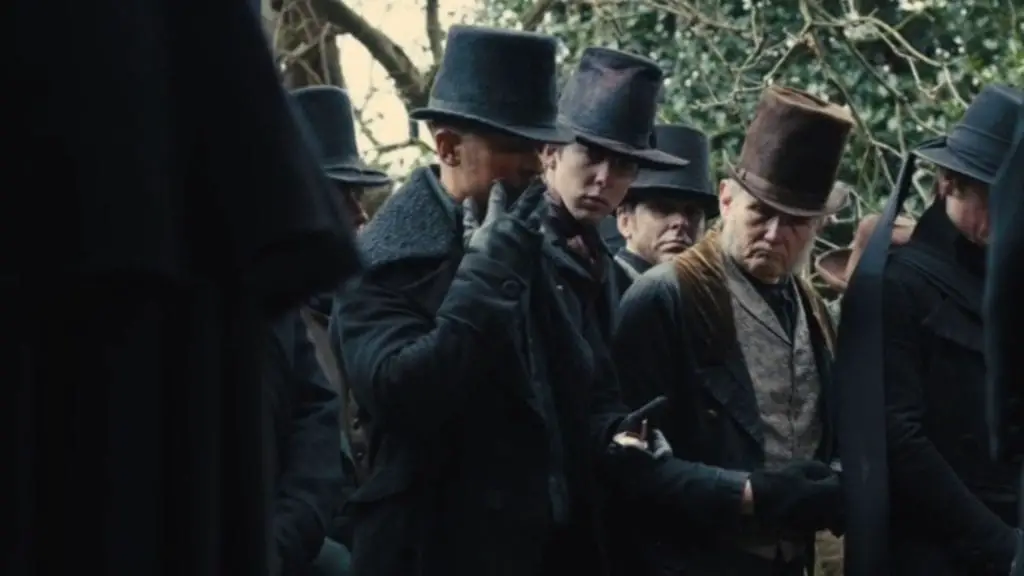
The action continues at the post funeral “party”. People gossip about James’s mother and insinuate that he is as crazy as she was in a wonderful display of 19th century’s misogyny and pseudo-scientific knowledge. We see Zilpha and her husband having an argument about her brother because her husband was expecting an inheritance that isn’t coming anymore. When they are on their way out, James intercepts Zilpha and gives us a good old-fashioned incestuous vibe. I mean it could be a misinterpretation because in France Donkey Skin is one of the fairy tales you have to know before you are ten. But saying the sentence “One thing that Africa did not cure is that I still love you.” while being that close doesn’t strike me as a show of brotherly-love.
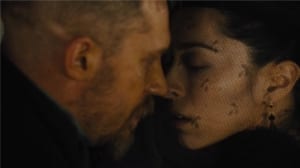
There is also a lawyer, Thoyt, who informs James that the only thing he will inherit from his driven-mad father is a worthless and dangerous property in North America. To which James answers, threateningly, “They are my rocks now.”.
We are then taken to a meeting of the leaders of The East India Company with Sir Stuart Strange (played by Jonathan Pryce) at their head. They discuss the public return of James and his lack of intention to sell his North American possessions with Thoyt. It is a problem for them because they have spent months crafting a deal with Zilpha and now it was all for nothing. They enumerate James’s achievements while being part of the East India Company where we learn that he was a brilliant young man but reckless, disrespectful of authority, dangerous, etc. They discuss rumors about James after his disappearance on a slave ship. Thankfully the scene has the good taste to stop there, after a very threatening display of authority by Sir Strange.
James goes back home and meets with the family’s butler, and the two seem to share a nearly filial bond. They discuss the past and James reveals that he knows all the family secrets that were “hidden” from him. Like that his mother was a Native American bought by his father with gunpowder. In the morning, James tries to put the family business in order by taking back his father’s office that was left abandoned for years. He also displaces the unofficial brothel that had been established in the building. He then meets a man and talks to him about the future of his bastard little brother.
In the mean time, Zilpha is writing a letter to her brother to convince him to renonce the inheritance. However, we quickly learn that her husband is forcing her to write it. They have an argument about it in which Zilpha shows her intelligence by using feminine stereotypes to her advantage. Her husband tries to gain the upper hand by accusing James of cannibalism and then forces her to rewrite the letter.
We return to James, who is meeting with the East India Company after discovering that his father was poisoned. The Company wants to push him to sell his lands. Indeed, it is a strategic commercial point and both England and a young United States want to claim ownership of it. James openly refuses the offer. Both sides threaten the other and everyone loses their temper. James leaves the meeting with war having been all but declared between him and the East India Company.
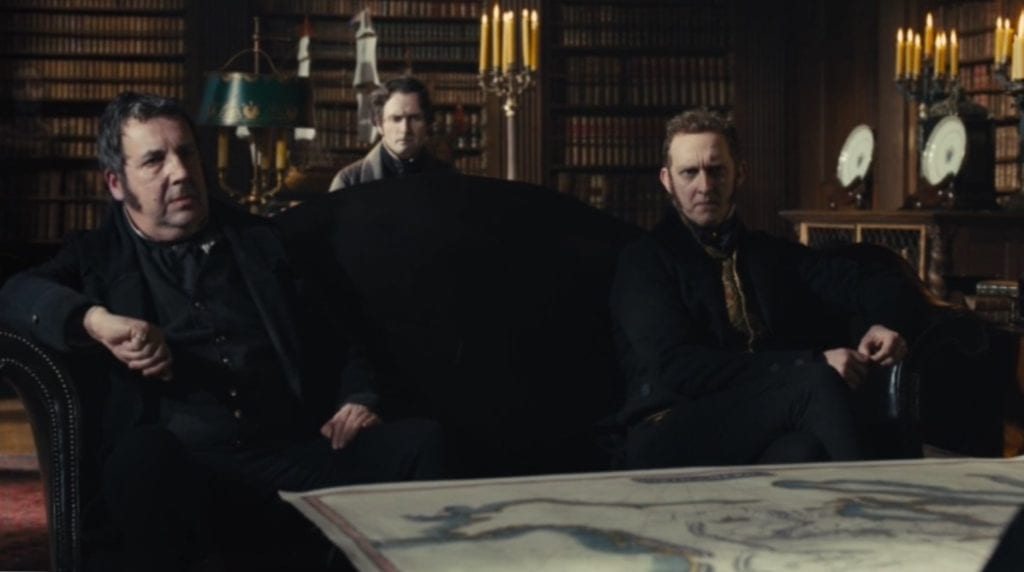
The episode closes on James reading a letter from Zilpha, but psych! it isn’t the one we saw her write. In it, she asks him to keep “the secrets of the past buried, buried in a deeper grave.”.
Review
So what is there to keep in this? Apart from Tom Hardy’s beautiful face of course.
First of all, the characters and dialogues are well written. From what we were shown, the primary characters have multi-faceted characterizations. They all appear to be capable of holding their ground in different ways. Zilpha, for example, tries her best to manage her husband by always appearing as the perfect 19th century woman. It doesn’t always work, but she does send a letter to James without him being aware. They display negative traits as well. James has poor mental stability and Sir Stuart Strange appears too choleric. Their relationships aren’t simple either. James and his butler obviously have affection for each other, but it didn’t prevent the latter from hidden things from our protagonist.
As for the dialogue, only one or two lines fall flat. Thoyt gives an explanation about his past without anyone asking him or seeming remotely interesting in it.
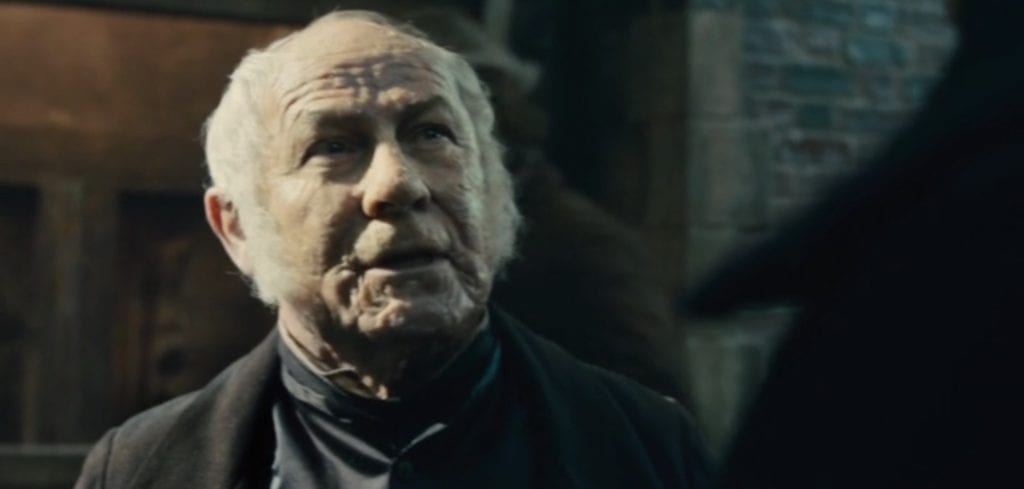
But most of the time, the writing heightens the tone. You see, there is no actual physical violence in this pilot. However, there are plenty of characters who threaten (as your humble servant has “subtly” established it in the recap) each other with said violence. Yet through impeccable acting/interpretation and well-written dialogue you believe each of them capable of it. If it comes down to violence, and I believe it will, it will not be pretty.
The pilot does a great job too, in establishing the atmosphere. The general aesthetic is: LIVING IN THE 19TH CENTURY SUCKS.
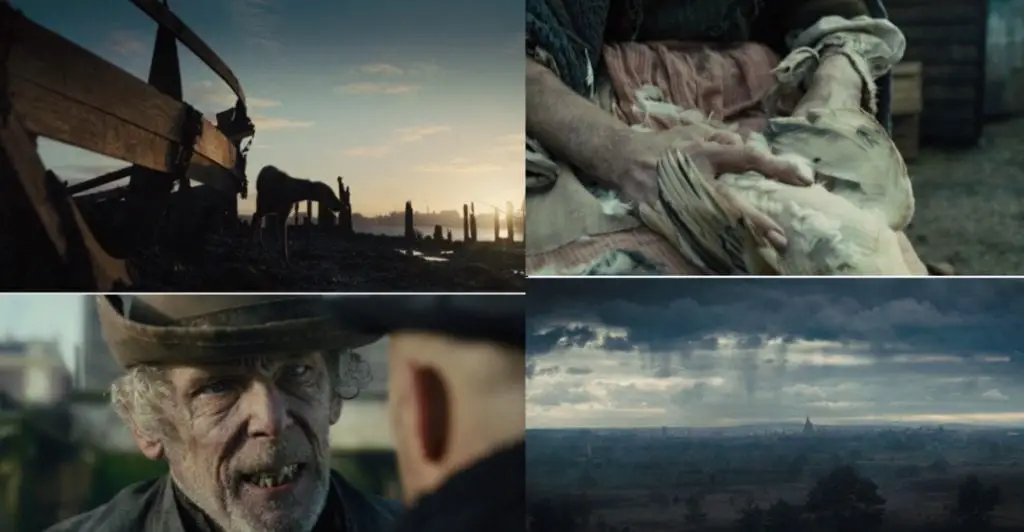
And it’s not just an empty artistic choice. It actually highlights what the story is trying to tell us. This society is unfair, the authority figures are evil. It’s only natural that in a visual media the visual part helps convey this message. Indeed, society’s rules, which are not idealized at all, have an impact on our characters. Especially with James and Zilpha for whom the social expectations seems to be working against them.
I have to mention the lighting, too. The show is, despite this grey atmosphere, rather beautiful and there is actual light to see what’s happening. Yay!
So, yes, it’s starting well. The story looks compelling, the characters well-thought out (and I have no doubt about Steven Knight’s capability of writing an anti-hero, see Tommy and Arthur Shelby’s cases), and it’s beautiful to watch. So for now: Hurrah! for a new good addition to the TV lineup. Let’s hope it will continue like this.
P.S.: I love the opening sequence so much, you have no idea.

